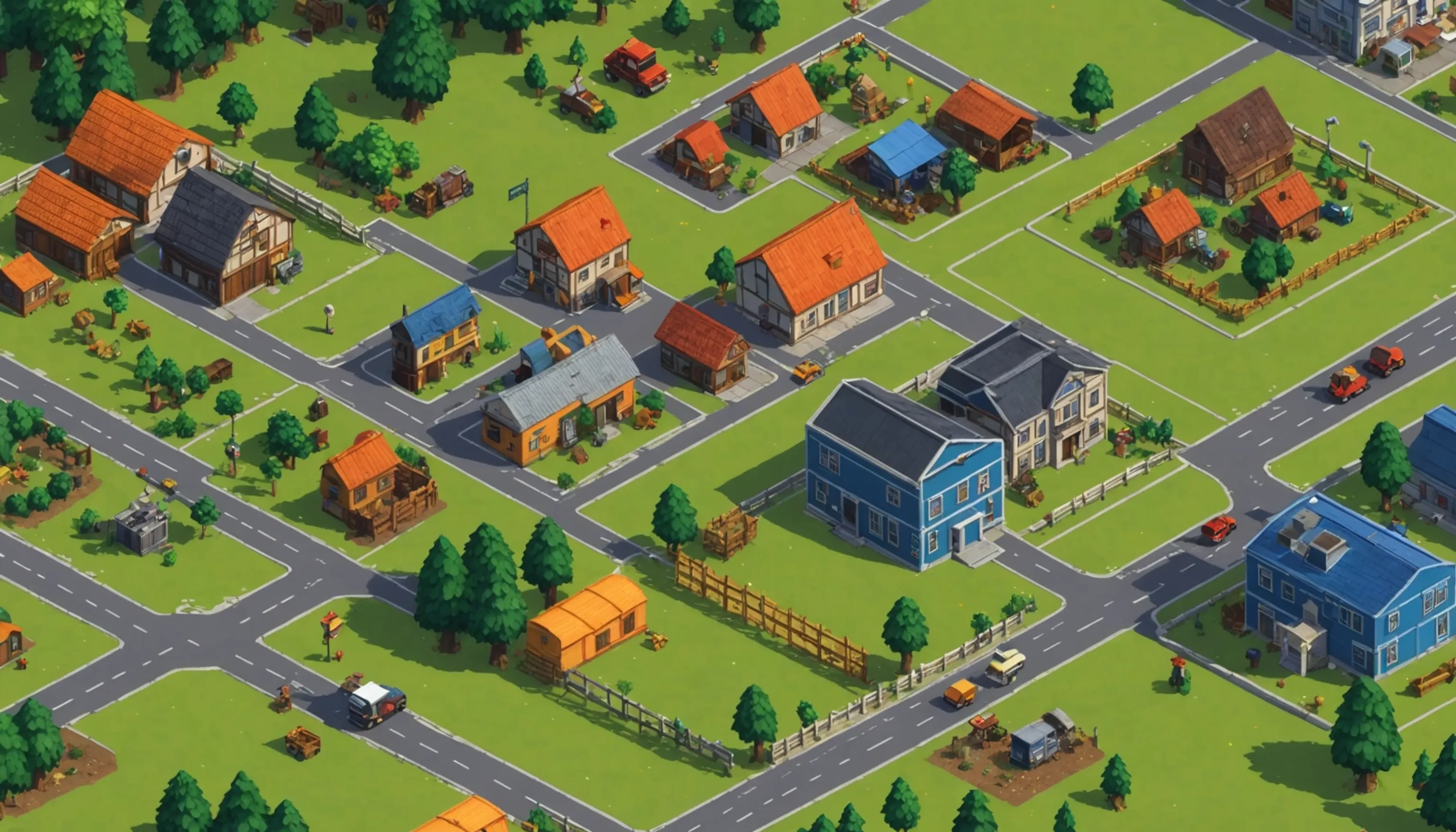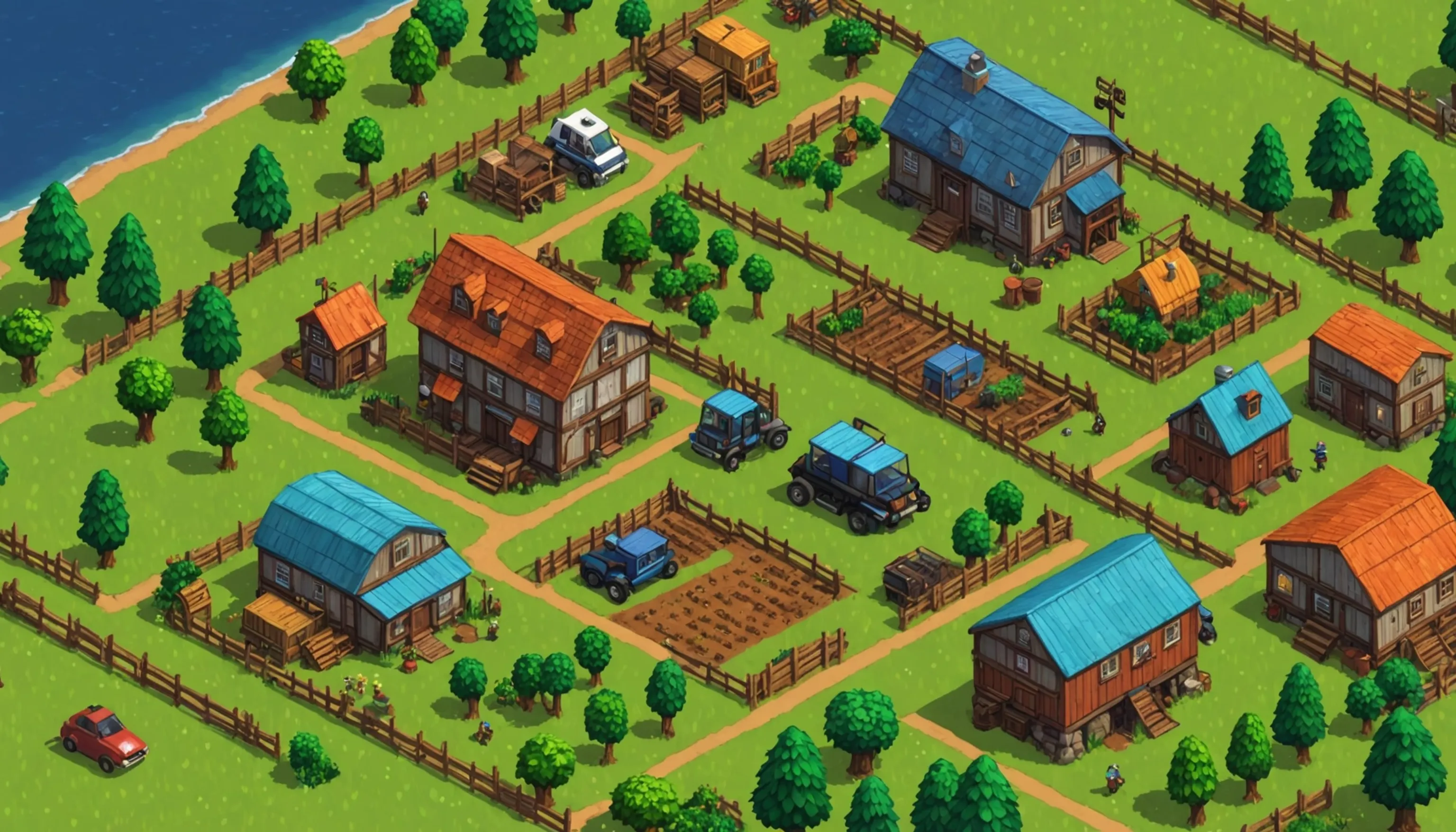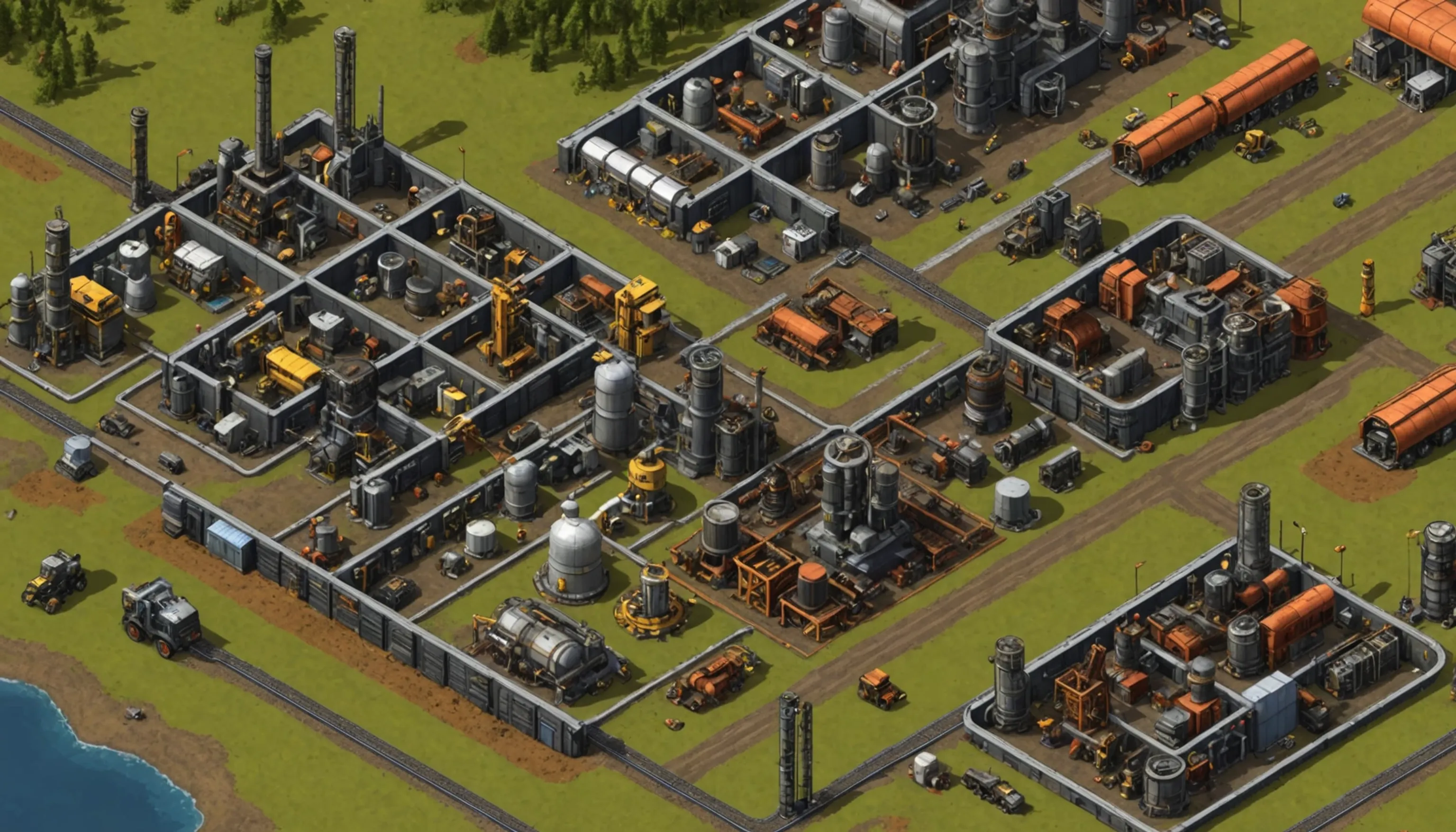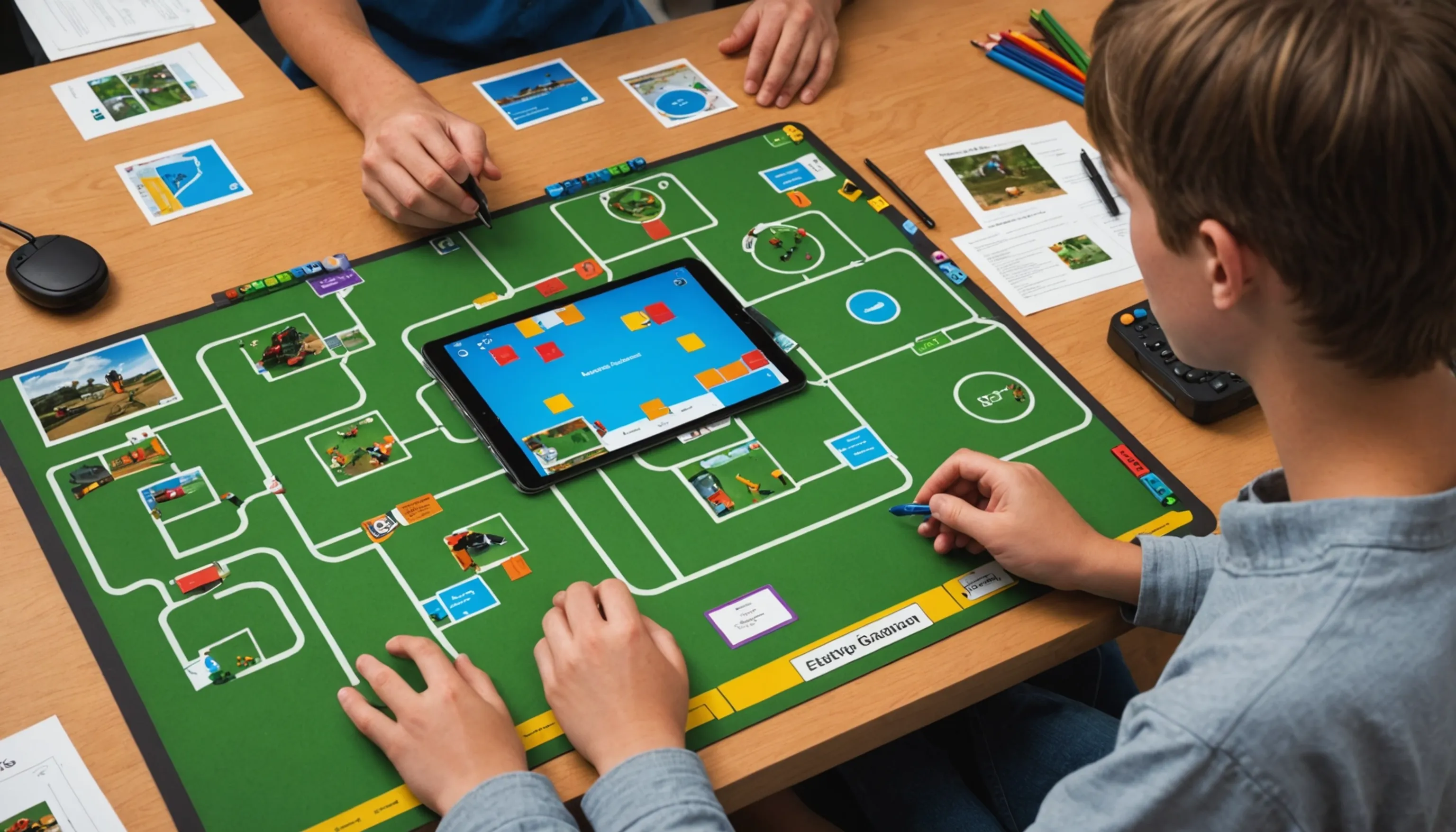Top-Rated Resource Management Simulation Games
 HvWHenry van Wagenberg
HvWHenry van Wagenberg
Top-Rated Resource Management Simulation Games for Teens
Resource management simulation games are a fantastic way for teens to engage in strategic thinking while having fun. Here are some top-rated resource management simulation games that are popular among teenagers:
- Stardew Valley: A charming farming simulator that encourages creativity and management skills.
- Cities: Skylines: A city-building game that challenges players to design and maintain a thriving metropolis.
- Factorio: A game focused on building and optimizing factories, promoting problem-solving and critical thinking.
- Prison Architect: A unique take on management where players design and manage a prison.
What are Resource Management Simulation Games?
Resource management simulation games are a genre of video games that focus on the management of resources to achieve specific objectives. In these games, players are often tasked with balancing various elements such as time, materials, and finances to create a successful outcome. This type of gameplay encourages strategic planning, critical thinking, and problem-solving skills.
Typically, players must gather resources, such as food, materials, or money, and allocate them efficiently to build structures, develop economies, or manage populations. Each decision can significantly impact the game's progress, making players think critically about their actions.
Some key characteristics of resource management simulation games include:
- Strategic Planning: Players must plan their moves carefully, considering both short-term and long-term consequences.
- Resource Allocation: Efficiently managing resources is crucial to success. Players often need to prioritize certain resources over others based on the game's goals.
- Dynamic Environments: Many games feature changing circumstances, such as economic shifts, disasters, or competition, requiring players to adapt their strategies.
- Progression Systems: Players often unlock new abilities, technologies, or resources as they progress, adding depth to the gameplay experience.
Overall, resource management simulation games provide engaging and educational experiences that can enhance a teenager's cognitive skills while offering hours of entertainment.
Benefits of Playing Resource Management Games
Playing resource management games offers a plethora of benefits for teenagers, making them an excellent choice for both entertainment and educational purposes. Here are some key advantages:
- Enhances Critical Thinking: These games require players to make strategic decisions based on limited resources. This fosters critical thinking as they evaluate different options and consider the consequences of their actions.
- Improves Problem-Solving Skills: Players face various challenges that demand innovative solutions. Whether it's managing a city, running a farm, or optimizing production lines, teens learn to approach problems methodically.
- Encourages Planning and Organization: Resource management games teach the importance of planning ahead. Players must allocate resources wisely, set priorities, and plan their moves to achieve their goals efficiently.
- Boosts Time Management: Many of these games operate within time constraints, requiring players to juggle multiple tasks. This aspect cultivates effective time management skills that are valuable in real-life situations.
- Promotes Teamwork: Some resource management games allow for multiplayer modes, encouraging collaboration and communication among players. This can enhance social skills and foster teamwork.
In conclusion, resource management simulation games are more than just fun; they equip teenagers with essential life skills. By engaging in these games, teens can improve their cognitive abilities while enjoying immersive gameplay experiences.

Top Resource Management Simulation Games
Here are some of the top resource management simulation games that teens can enjoy:
- Stardew Valley: A charming farming simulator that encourages creativity while managing crops and livestock.
- Cities: Skylines: An engaging city-building game that allows players to design and manage their own metropolis.
- Factorio: A complex game where players build and optimize factories, emphasizing resource production and logistics.
- Prison Architect: A unique management game where players design and run a prison, focusing on staff and inmate management.
Stardew Valley
Stardew Valley is a beloved indie farming simulation game that has captured the hearts of players worldwide. Released in 2016, it allows players to escape the hustle and bustle of city life by taking over a run-down farm in the idyllic town of Pelican Town.
In Stardew Valley, players engage in various activities such as:
- Farming: Planting and harvesting crops, raising animals, and expanding their farm.
- Mining: Exploring caves to gather resources, combat monsters, and discover valuable items.
- Fishing: Catching different fish in various locations, which can be sold or used in cooking.
- Crafting: Creating tools, machines, and other items to enhance farm productivity.
One of the game's most appealing aspects is its open-ended nature. Players can choose to focus on farming, building relationships with townsfolk, or engaging in various side quests. This flexibility allows players to tailor their experience based on their interests.
Moreover, Stardew Valley is rich in educational value. It promotes essential skills like resource management, strategic planning, and time management. Players must balance their daily activities while considering the changing seasons and the needs of their farm.
With its charming pixel art graphics, relaxing soundtrack, and engaging gameplay, Stardew Valley remains a top choice for teens seeking a fulfilling and enjoyable gaming experience.
Cities: Skylines
Cities: Skylines is a critically acclaimed city-building simulation game that allows players to create and manage their own metropolis. Released in 2015, the game offers a detailed and immersive experience, enabling players to design everything from residential zones to intricate public transportation systems.
In Cities: Skylines, players are tasked with:
- Urban Planning: Designing the layout of the city, including residential, commercial, and industrial areas.
- Infrastructure Management: Building roads, bridges, and public transport networks to ensure smooth connectivity and reduce traffic congestion.
- Public Services: Providing essential services such as healthcare, education, and emergency services to meet the needs of the growing population.
- Environmental Considerations: Balancing development with sustainability by managing pollution, waste, and green spaces.
One of the standout features of Cities: Skylines is its depth and realism. Players must consider factors like traffic flow, citizen happiness, and economic stability while making decisions. The game encourages critical thinking and strategic planning, as players navigate challenges like natural disasters and budget constraints.
Furthermore, Cities: Skylines supports a vibrant modding community, allowing players to expand their cities with additional content and features. This extensibility keeps the gameplay fresh and engaging.
With its stunning graphics, dynamic gameplay, and emphasis on creativity, Cities: Skylines remains a top choice for teens interested in city management and urban development.

Factorio
Factorio is a highly acclaimed resource management and automation simulation game that has garnered a dedicated following since its release in 2020. In this game, players assume the role of an engineer stranded on an alien planet, tasked with building and optimizing factories to ultimately launch a spacecraft back to their home planet.
In Factorio, players engage in various activities, including:
- Resource Gathering: Collecting raw materials like iron, copper, and coal to create components necessary for factory construction.
- Automation: Designing intricate conveyor belt systems and machinery to automate production processes, reducing the need for manual labor.
- Researching Technologies: Unlocking new technologies and upgrades that enhance efficiency and expand capabilities, allowing for more complex factory setups.
- Defending Against Aliens: Protecting your factory from alien creatures that become hostile as pollution spreads, adding an element of challenge and strategy.
What sets Factorio apart is its deep and engaging gameplay. Players must think critically about logistics, resource management, and spatial efficiency while navigating challenges such as resource scarcity and alien threats.
The game also supports multiplayer mode, enabling friends to collaborate on large-scale projects, making it a fantastic social experience.
With its intricate mechanics, rewarding gameplay, and emphasis on creativity, Factorio remains a top-tier choice for teens interested in engineering, strategy, and problem-solving.
Prison Architect
Prison Architect is a unique and captivating simulation game that puts players in charge of designing and managing a high-security prison. Released in 2015, this game combines elements of strategy and resource management, challenging players to create a functioning facility while ensuring security and rehabilitation.
In Prison Architect, players engage in various activities, including:
- Prison Design: Crafting the layout of the prison, including cell blocks, common areas, and security measures to prevent escapes and riots.
- Resource Management: Allocating funds to build facilities, hire staff, and maintain operations, all while adhering to a budget.
- Managing Inmates: Understanding the needs and behaviors of different prisoners, implementing programs for rehabilitation, and ensuring their safety within the prison.
- Security Measures: Establishing security protocols, such as hiring guards and installing surveillance systems, to prevent disturbances and maintain order.
One of the standout features of Prison Architect is its focus on moral choices. Players are often faced with dilemmas, such as prioritizing inmate welfare versus prison security, which adds depth to the gameplay.
Additionally, the game includes a campaign mode with engaging storylines, as well as a sandbox mode for players to unleash their creativity without limitations.
With its mix of strategy, management, and ethical considerations, Prison Architect offers a thought-provoking experience for teens interested in architecture, psychology, and societal issues.
How to Choose the Right Game for Your Teen
Choosing the right resource management simulation game for your teen can be a rewarding experience. Here are some key factors to consider:
- Consider Age Appropriateness: Check the game’s rating and ensure it’s suitable for your teen’s age group. Look for games with content that aligns with your values.
- Look for Educational Value: Opt for games that promote critical thinking, problem-solving, and strategic planning. Games like Stardew Valley or Cities: Skylines not only entertain but also teach valuable skills.
- Check Gameplay and Reviews: Research gameplay mechanics and read reviews from other parents and players. This can provide insight into the game's quality and engagement level.
By considering these factors, you can select a game that is not only enjoyable but also beneficial for your teen's development.
Consider Age Appropriateness
When selecting a resource management simulation game for your teen, considering age appropriateness is crucial. Video game ratings provide valuable guidance on the content, helping parents make informed decisions. Most games are assigned ratings by organizations such as the ESRB (Entertainment Software Rating Board) or PEGI (Pan European Game Information), which indicate the suitability of the game for various age groups.
For instance, games rated E for Everyone are suitable for all ages and typically contain no inappropriate content. In contrast, games rated T for Teen may include mild violence or themes that are more suitable for older players. Always check the content descriptors provided by the rating system to understand what elements are present in the game.
Additionally, consider your teen's maturity level. Some teens may be ready for more complex themes or strategies, while others might prefer lighter, more casual gameplay. Engaging in discussions with your teen about their gaming preferences can help you gauge what they are comfortable with.
Ultimately, ensuring that the game aligns with your family values and your teen's maturity will not only enhance their gaming experience but also promote responsible gaming habits. This thoughtful approach can lead to a more enjoyable and enriching gaming journey.
Look for Educational Value
When selecting a resource management simulation game for your teen, it's essential to look for educational value. Many games in this genre are not only entertaining but also promote critical skills that can benefit your teen in various aspects of life.
Resource management games often require players to engage in strategic thinking, problem-solving, and planning. For instance, games like Stardew Valley teach time management as players balance farming, resource gathering, and social interactions. Similarly, Cities: Skylines encourages urban planning and understanding the complexities of managing a city, such as infrastructure and public services.
In addition to cognitive skills, these games often incorporate elements of economics and resource allocation. For example, in Factorio, players must optimize production lines and manage resources efficiently, which can provide insights into logistics and manufacturing processes.
Moreover, many resource management games offer opportunities for teamwork and collaboration, especially in multiplayer modes. This fosters communication skills and encourages players to work together to achieve common goals.
Before making a purchase, research the educational aspects of the game. Read reviews and descriptions to understand how the gameplay mechanics promote learning and personal growth. By choosing games with strong educational value, you can ensure that your teen enjoys a fun and enriching gaming experience.
Check Gameplay and Reviews
When selecting a resource management simulation game for your teen, it’s vital to check gameplay and reviews to ensure that the game is both enjoyable and suitable. Understanding the mechanics and overall experience can help you make an informed decision.
Start by watching gameplay videos or reading gameplay summaries to get a feel for the game. This will provide insight into how the game operates, its objectives, and whether it aligns with your teen’s interests. Look for features such as graphics quality, user interface, and complexity of gameplay, as these can greatly influence the gaming experience.
Additionally, reviews from other players and parents can offer valuable perspectives. Websites like Steam or Metacritic provide user ratings and detailed reviews that highlight strengths and weaknesses. Pay attention to comments regarding difficulty levels, engagement, and educational value. Many parents share their experiences about how a particular game has impacted their teen’s skills or interests.
Consider looking for reviews from reputable gaming websites or blogs that specialize in family-friendly games. These sources often provide comprehensive insights, covering aspects like age appropriateness and educational content, which can help you gauge whether the game is a good fit.
Lastly, don’t hesitate to engage with your teen about their preferences. Discussing their favorite games and what they enjoy about them can guide you in selecting a game that will keep them engaged while offering a rewarding experience.
